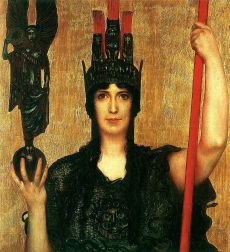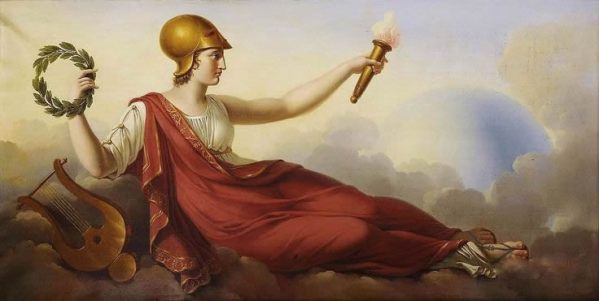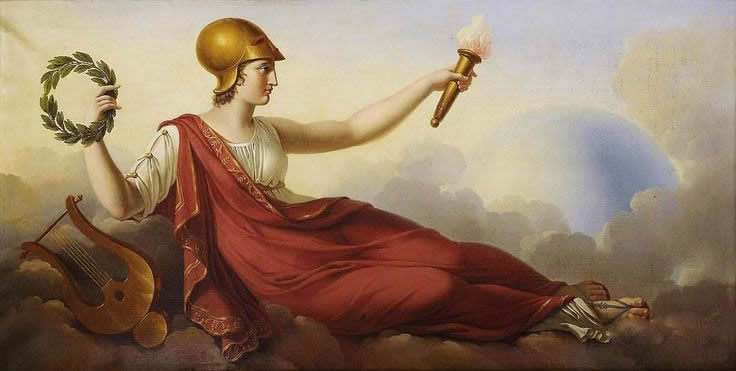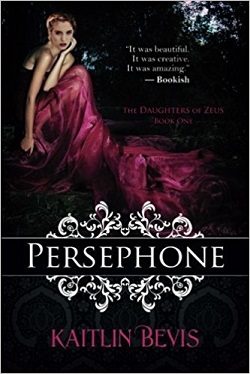The ancient world often portrayed its wisdom figures—whether literal divinity or personification of virtue—as feminine. The Greeks gravitated toward this in the form of Athena, wisdom-warrior goddess, and later in the form of Sophia, one of Plato’s four cardinal virtues. Yet before these two more renowned figures was Metis.
 Hesiod’s Theogany[1] places Metis among the second generation of Titans. She is the daughter of Oceanus and Tethys, and her siblings numbered in the thousands. Hesiod calls her the wisest among both gods and mortals. Zeus took her as his first wife, perhaps desiring to have constant access to her counsels as he was establishing his rule. However, Metis was prophesied to bear children who would inherit her great wisdom and who could potentially overthrow Zeus. To prevent this, Zeus deceived Metis into transforming herself into a fly, whereupon he swallowed her, unaware that Metis had already conceived a child. For Zeus, it was enough that he had corralled Metis in such a way that she would never bear her fated children but would still “devise for him both good and evil.”
Hesiod’s Theogany[1] places Metis among the second generation of Titans. She is the daughter of Oceanus and Tethys, and her siblings numbered in the thousands. Hesiod calls her the wisest among both gods and mortals. Zeus took her as his first wife, perhaps desiring to have constant access to her counsels as he was establishing his rule. However, Metis was prophesied to bear children who would inherit her great wisdom and who could potentially overthrow Zeus. To prevent this, Zeus deceived Metis into transforming herself into a fly, whereupon he swallowed her, unaware that Metis had already conceived a child. For Zeus, it was enough that he had corralled Metis in such a way that she would never bear her fated children but would still “devise for him both good and evil.”
Lodged in the belly of her husband, Metis did not sit idle. She crafted weapons and armor for her daughter, Athena, and when she sprang from Zeus’s head on the banks of the river Trito, she was fully matured and battle-ready. Pindar, in his Seventh Olympian Ode[2], tells further that Hephaestus split Zeus’s head with an axe so that Athena could emerge, perhaps because the smithing of Metis was so painfully cacophonous to the thunder god.

Neither Hesiod nor Pindar shed any light on how Zeus was able to trick Metis, and so here we enter the realm of speculation. Could it be that Metis perceived her husband’s fears in light of the prophecy and, rather than leaving him and risk the world crumbling into chaos in her absence, altered herself to perpetuate the effects of her own wisdom in Zeus’s rule? She knew his might alone would not be sufficient to maintain order. Into his depths she went, creating a somewhat blurred symbiosis of masculinity and femininity from which issued Athena, out of her mother’s womb first but then her father also—a womb containing a womb.
This dependence of rulers on feminine wisdom is carried over into Plato’s Republic[3], where he envisions the head of his utopia as a philosopher king, a friend to the feminine embodiment of Wisdom or Sophia. Plato also calls Sophia the noblest of the parts of virtue in his Protagoras.[4]
A similar personification of Divine Wisdom as feminine can be found in the Hebrew scriptures. The first chapter of Proverbs entreats the hearer to heed Wisdom’s voice and avoid disaster.[5] Some of the early Christian Fathers, including Justin Martyr and Origen, would eventually attempt to marry Platonic philosophy with these passages, describing the Divine Wisdom (Hagia Sophia) as an aspect of the Logos—the pre-incarnated, cosmic Christ—from John 1.[6] Here in Christianity, too, is the universe born and sustained through the partnership of masculinity and femininity.
Thus, when vehicles change—Greek mythology to philosophy to Christianity—Divine Wisdom, following in Metis’s metamorphosing footsteps, changes with them. Yet always, in whatever form, she persists as a creative force, a vital bulwark against disorder.

[1] http://www.theoi.com/Text/HesiodTheogony.html#n30
[2] http://www.bartleby.com/library/prose/4043.html
[3] http://classics.mit.edu/Plato/republic.html
[4] http://classics.mit.edu/Plato/protagoras.html
[5] https://www.biblegateway.com/passage/?search=Proverbs+1%3A20-33&version=NRSV
[6] https://www.biblegateway.com/passage/?search=John+1%3A1-5&version=NRSV


 the goddess won, but rather than depriving young Arachne of life or talent, she merely turned her into a spider. Athena actually knew many a weaver, and in Homeric legend, she encountered several when she mentored the hero Odysseus on his long voyage home from the Trojan War.
the goddess won, but rather than depriving young Arachne of life or talent, she merely turned her into a spider. Athena actually knew many a weaver, and in Homeric legend, she encountered several when she mentored the hero Odysseus on his long voyage home from the Trojan War. convinced Zeus to fetch him home. Calypso trembled with rage: “You gods, she exclaimed, ought to be ashamed of yourselves. You are always jealous and hate seeing a goddess take a fancy to a mortal man, and live with him in open matrimony” (V).
convinced Zeus to fetch him home. Calypso trembled with rage: “You gods, she exclaimed, ought to be ashamed of yourselves. You are always jealous and hate seeing a goddess take a fancy to a mortal man, and live with him in open matrimony” (V). most generous farewell.
most generous farewell.



 King Cleomenes managed to get himself to the acropolis, the central and most important part of the ancient Athenian polis, also the location of the holy temple of Athena. Weary and looking for a moment of spiritual reflection, Cleomenes, King of Sparta enters to the holiest place in the city of Athens, to pray. I imagine he opened the temple door, ready to step into the welcome cool dim within when he heard an angry female voice. An angry and powerful female voice, accustomed to being obeyed.
King Cleomenes managed to get himself to the acropolis, the central and most important part of the ancient Athenian polis, also the location of the holy temple of Athena. Weary and looking for a moment of spiritual reflection, Cleomenes, King of Sparta enters to the holiest place in the city of Athens, to pray. I imagine he opened the temple door, ready to step into the welcome cool dim within when he heard an angry female voice. An angry and powerful female voice, accustomed to being obeyed. oracular visions of the coming of Jesus Christ and the ultimate establishment of Christendom. Yet it is interesting to note that Christians of this age viewed the prophesy of the Cumae Sibyl as a frightening example of female paganism. This is a fascinating conflict, despite rejecting paganism itself, they acknowledged the power of the female prophetess. Christian scholars were convinced that Sibyl, by divine power, had foreseen the birth of Jesus and through extension rejected Roman pagan authority.“By Destiny’s unalterable decree. Assume thy greatness, for the time draws night, Dear child of gods, great progeny of Jove!”2 While the Sibyl represented a pagan belief system, medieval scholars recognized that she held a special power, especially if she foresaw the coming of their Lord.
oracular visions of the coming of Jesus Christ and the ultimate establishment of Christendom. Yet it is interesting to note that Christians of this age viewed the prophesy of the Cumae Sibyl as a frightening example of female paganism. This is a fascinating conflict, despite rejecting paganism itself, they acknowledged the power of the female prophetess. Christian scholars were convinced that Sibyl, by divine power, had foreseen the birth of Jesus and through extension rejected Roman pagan authority.“By Destiny’s unalterable decree. Assume thy greatness, for the time draws night, Dear child of gods, great progeny of Jove!”2 While the Sibyl represented a pagan belief system, medieval scholars recognized that she held a special power, especially if she foresaw the coming of their Lord. sacred womanhood is not to be underestimated. This is reflected in the very stories of the divine, contained with the feminine— a sacred looming power.
sacred womanhood is not to be underestimated. This is reflected in the very stories of the divine, contained with the feminine— a sacred looming power. “At your battle-cry, my lady, the foreign lands bow low. When humanity comes before you in awed silence at the terrifying radiance and tempest, you grasp the most terrible of all the divine powers. Because of you, the threshold of tears is opened, and people walk along the path of the house of great lamentations. In the van of battle, all is struck down before you. With your strength, my lady, teeth can crush flint. You charge forward like a charging storm.
“At your battle-cry, my lady, the foreign lands bow low. When humanity comes before you in awed silence at the terrifying radiance and tempest, you grasp the most terrible of all the divine powers. Because of you, the threshold of tears is opened, and people walk along the path of the house of great lamentations. In the van of battle, all is struck down before you. With your strength, my lady, teeth can crush flint. You charge forward like a charging storm.